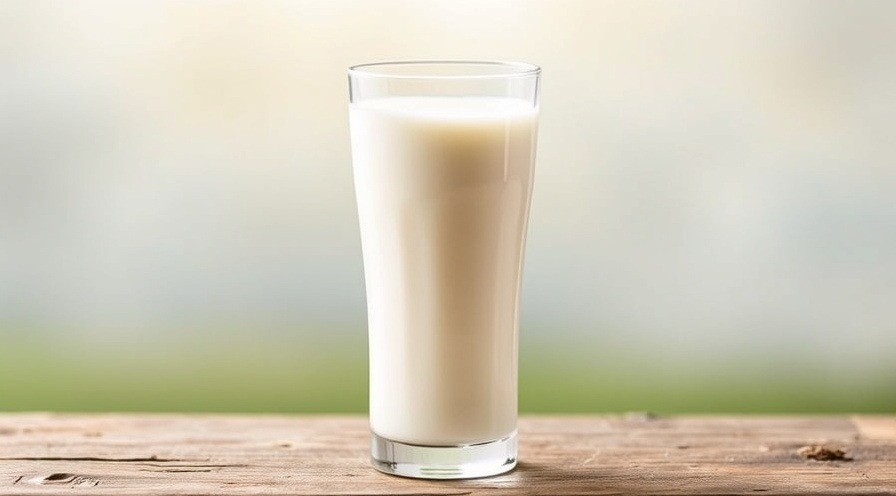
Beyond the Glass: Unpacking the Health Truths About Whole Milk According to a Registered Dietitian
Have you ever stood in the dairy aisle, debating between skim, 2%, and whole milk? You're not alone. Whole milk, often carrying a reputation for being less healthy due to its fat content, is now being re-evaluated. A recent article on Health.com by registered dietitian Jillian Kubala, MS, RDN, delves into the science-backed benefits, nutritional profile, and potential risks of this creamy beverage, offering a comprehensive look at whether whole milk deserves a place in your diet.
The Essence of Whole Milk:
Kubala clarifies that whole milk is simply milk that hasn't had its butterfat removed and, by definition, contains at least 3.25% milk fat by weight. This seemingly simple difference has significant implications for its nutritional value and potential health effects.
Unveiling the Benefits:
Kubala highlights several compelling reasons why whole milk might be beneficial:
May Reduce Disease Risk:
Surprisingly, Kubala cites a research review indicating that daily consumption of milk, including whole milk, is linked to a lower risk of common diseases such as heart disease, stroke, metabolic syndrome, high blood pressure, obesity, colorectal cancer, and osteoporosis. The nutrients within milk are thought to offer protection against these conditions. For instance, the calcium in milk may bind to harmful substances in the gut, potentially preventing colorectal cancer growth.
Packed with Beneficial Fatty Acids:
Whole milk boasts over 400 different fatty acids, many of which contribute to good health. Due to its higher fat content, whole milk provides more of these beneficial fats, including C15:0 (pentadecanoic acid) and C17:0 (heptadecanoic acid), which research suggests may reduce inflammation, support cellular repair, and lower blood lipid levels – all contributing to heart health.
Notably, whole milk from grass-fed cows contains even higher levels of omega-3 fatty acids (known for their anti-inflammatory properties) and conjugated linoleic acid (CLA), which may have heart-protective qualities.

A Powerhouse for Bone Health:
Whole milk is an excellent source of vital nutrients for strong bones. Just one cup provides 23% of the Daily Value (DV) for calcium, a crucial mineral for bone mineralization. It also delivers protein, phosphorus, and magnesium, all essential for bone health.
Furthermore, most whole milk in the United States is fortified with vitamin D, which is necessary for the body to absorb calcium effectively. Including milk in your diet may help prevent bone loss, increase bone density, and reduce the risk of fractures and osteoporosis.
Surprisingly Supportive of Weight Management:
Despite its higher calorie count compared to lower-fat options, studies suggest that whole milk might actually aid in weight management. Kubala points to a recent study linking whole milk intake to lower body weight, smaller waist size, and a reduced risk of obesity. Another review found a 39% lower risk of being overweight or obese in children associated with whole milk intake compared to reduced-fat milk.
This could be because whole milk helps slow digestion, promotes feelings of fullness, and can replace calories from less nutritious sugary drinks. Certain fatty acids like CLA and butyric acid may also play a role in reducing calorie intake and increasing calorie burning.
Decoding the Nutrition:
Kubala provides a detailed breakdown of the nutrients found in one cup of whole milk:
Calories: 149
Carbohydrates: 11.3 g
Total Fat: 7.81 g (including 4.54 g of saturated fat and 1.68 g of unsaturated fat)
Cholesterol: 29.3 mg
Protein: 7.98 g (a complete protein containing all nine essential amino acids, with both casein and whey proteins beneficial for muscle building)
Vitamin B12: 1.32 mcg (55% DV, important for neurological function, metabolism, and red blood cell production)
Riboflavin (B2): 0.33 mg (25.9% DV)
Calcium: 300 mg (23% DV, essential for bone health, nerve and muscle function, and more)
Phosphorus: 246 mg (19.68% DV, crucial for bone health)
Zinc: 1 mg (9% DV, needed for immune function, cell division, and protein and DNA synthesis)
Vitamin D: 12% DV (in fortified milk, promoting calcium absorption and supporting immune health)
The nutritional content can vary based on the cows' diet, with organic and grass-fed milk often containing higher levels of antioxidants like vitamin E and beta-carotene.
Acknowledging the Risks:
While highlighting the benefits, Kubala also addresses the potential downsides of whole milk consumption:
Potential Link to Certain Diseases:
Some research suggests a possible association between high milk consumption and a greater risk of prostate cancer, Parkinson's disease, and acne, although more research is needed. Individuals at higher risk for these conditions might consider moderating their milk intake.
Lactose Intolerance:
Cow's milk contains lactose, a sugar that can cause digestive issues for people with lactose intolerance due to insufficient lactase enzyme production. Symptoms can include diarrhea and gas. Lactose-intolerant individuals should either avoid milk or opt for lactose-free alternatives.
Saturated Fat and Cholesterol Content:
Whole milk is higher in saturated fat and cholesterol compared to lower-fat milk products. While this isn't generally a concern for most people, those with certain health conditions, such as familial hypercholesterolemia (a genetic condition causing high LDL cholesterol), may need to limit their intake of cholesterol-rich foods like whole milk.
Not Suitable for All Diets:
Whole milk is not appropriate for individuals following vegan or paleo diets.

Practical Tips for Enjoying Whole Milk:
Kubala offers several ways to incorporate whole milk into your diet:
Add it to smoothies and protein shakes.
Drink it as a post-workout snack.
Use it in breakfast staples like cereal and oatmeal.
Incorporate it into baking for cakes, pies, and cookies.
Add a splash to coffee or tea.
Mix it into soups and sauces for extra creaminess.
Kubala advises choosing unsweetened whole milk and notes that while all whole milk is nutritious, organic and grass-fed options may offer higher levels of certain nutrients and support better dairy cow welfare.
Final Thoughts
Jillian Kubala's article provides a balanced perspective on whole milk. It's a nutrient-dense food with potential benefits for reducing disease risk, providing beneficial fats, supporting bone health, and even aiding in weight management. However, it's essential to be aware of the potential risks, particularly for those with lactose intolerance or certain health conditions.
Ultimately, whether or not to include whole milk in your diet is a personal decision that may depend on your individual health needs and dietary preferences. Consulting with a healthcare professional or registered dietitian can help you make informed choices that align with your overall wellness goals.
This insightful article from Health.com serves as a valuable resource in navigating the often-confusing world of nutrition and understanding the potential role of whole milk in a healthy eating pattern.
 Add Row
Add Row  Add
Add 




 Add Row
Add Row  Add
Add 

Write A Comment